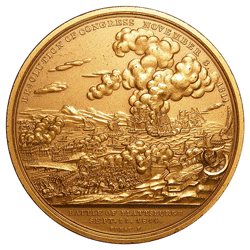
Alexander Macomb Chapter, NSDAR
Mount Clemens, Michigan
Alexander Macomb
Congressional Medal of Honor of General Alexander Macomb
Designed for the the United States Mint by artist and steel engraver Moritz Fuerst (1782-1840), the medals commemorate a particular person’s achievements in their service to America. Each medal is designed differently, with no set design. Photos courtesy from Wikipedia Commons and was released into public domain by its author, Miloyd57at English Wikipedia.
Alexander Macomb was born in 1782 in British-held Detroit. His father, Alexander Macomb Sr., was a merchant and fur trader from Albany, New York, and his mother was Mary Catherine Navarre, who was of French descent.
About 1785, the family moved to New York City. Here his father gained more wealth as a land speculator, buying four million acres of land in New York from the government after the American Revolutionary War. The land was originally occupied by the Iroquois nations, but they left and went into exile in Ontario following British defeat in the American Revolutionary War.
Alexander received a classical education at Newark Academy in New Jersey. His military career began in 1798 at age of 16, when he joined a New York militia company. In January 1799 during the Quasi-War (a conflict, or undeclared war fought mostly at sea during 1798-1800 between the United States and Republic of France), he was recommended for a commission as a cornet in the Regular Army by Alexander Hamilton. In March 1799 he was promoted to second lieutenant and honorably discharged in 1800.
In 1801 Macomb was commissioned a second lieutenant and served as secretary to a commission involved in the Southwest with Native Americans. A year later he married a cousin, Catherine Macomb, and then went on to receive the following promotions: June 1805-captain; February 1808-major; July 1810-lieutenant colonel. In July 1810, he was chief engineer in the Corps of Engineers and in charge of coastal fortifications in the Carolinas and Georgia.
During the war of 1812, Macomb was a brigadier general in command of the frontier in northern New York. On September 11, 1814, at the Battle of Plattsburgh, with only 1,500 regular troops and a few detachments of militia, Macomb found himself opposed by a British force of 10,531 men under Lieutenant General George Prevost. Alexander’s outnumbered troops fell back before the British columns in a series of encounters as General Prevost advanced towards the American defensive works. However, what General Prevost did not know was that in the weeks leading up to the battle, Macomb, knowing that he would be heavily outnumbered, worked with his men to move trees and create fake roads to obscure the genuine roads and lead the British into dead-end traps far from the three nearby American forts. The British attack halted when the long narrow lines of marching soldiers were unable to easily stop and about-face. They became entangled in the narrow false roads and were sitting targets for the waiting Americans.
As General Prevost was about to launch an assault on the American defenses, he received news of the defeat of the British naval squadron on Lake Champlain. The General needed the British Lake Champlain squadron to supply his planned advance into Vermont. Without it, he had no choice but to abandon the expedition. The British invaders marched off back to Canada. Macomb was tagged as “The Hero of Plattsburg.” He was promoted to major general for his conduct at the battle and received a Congressional Gold Medal.
In February 1828 Major General Jacob Brown, the commanding General of the U.S. Army died. In the following year on May 29, 1829, Alexander was promoted by John Quincy Adams to fill the vacant position of Commanding General. During his tenure, he recommended a doubling of Army strength to hold the Native Americans in check, increasing the enlisted men’s pay to discourage desertion, implementing relief for widows and orphans of regular officers who had died of wounds and disease, and creating a system of officer retirement and replacement. Alexander Macomb died June 25, 1841, and was buried in the Congressional Cemetery in Washington D.C.

